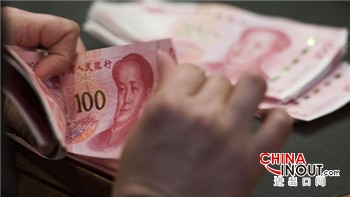过去一年里,中国以前所未有的方式把自己的印记加在世界经济上。中国经济放缓不仅给能源和大宗商品生产国带来痛苦;它还严重制约了其它发展中国家的增长,拖累了全球经济增长。同样引人注目的是今夏中国股市大幅下跌以及把握不当的人民币贬值促使美联储(Federal Reserve)在9月份推迟加息。
与美联储相比,没有一家央行在制定政策时更加不容易受到外部影响。美联储这一次意外表现出敏感性,突显世界已被中国的崛起改变。
最后,人民币被纳入国际货币基金组织(IMF)的储备货币篮子,使北京方面的雄心得以实现。
2016年,中国将再次成为决定世界经济走势和资本流动方向的非常重要的因素。但这一次的故事不会再是关于经济放缓。正如工业生产数据所表明的,各项经济刺激措施正在奏效。更强劲的基础设施投资,尤其是来自地方政府的此类投资,正使投资出现起色。国有企业近来加大了投资力度。
这代表着回归由投资和出口拉动的、北京方面此前试图摆脱的旧的增长模式。面对今年程度远超预期的经济放缓,党的官员们改变了政策,无疑担心老工业出现大量失业将导致社会不安定,进而对党的执政地位构成威胁。
明年将出现确凿的证据,显示转向消费的经济再平衡以及推进金融自由化的计划是否已被彻底抛弃。如果答案为是,中国将在以后为延续浪费的资源分配不当付出更高代价。
世界其他地区将会付出代价。一种不可持续的增长模式的恶性外部结果是,近年许多产业的回报率低迷,因为中国加剧了全球产能过剩。在分析美国以及欧洲大多数国家自金融危机爆发以来工业投资水平偏低时,人们对这个因素说得不够多。
一个主要问题涉及汇率战争。中国工业近年受困于缺乏竞争力的汇率,人民币盯住不断飙升的美元使这个问题更加严重。本月中国央行宣布转向以一篮子货币为基准,表面上有助于过渡到在更大程度上由市场决定的人民币汇率形成机制。但它也提供了一层掩护,让中国人民银行(PBoC)引导人民币贬值。与此同时,大幅下跌的生产者价格正在加剧人民币实际汇率走低。
对世界其他地区而言,人民币有序的贬值也许是一件可对付的事情,因为发达经济体目前受困于需求不足。来自中国的更便宜进口,加上油价下跌增加消费者收入,将有益地促进消费。
如果是比较剧烈的贬值(或许被日本进一步付诸竞争性贬值所引发),那可能就是另外一回事了,尤其是如果它在美国的大选年激发美国的保护主义冲动。美国的可贸易商品部门相对于整体经济规模并不大,但美国出口商在国会山有相当强大的游说力量。但话说回来,全球供应链的存在意味着,保护主义论调可能会比全球化之前的时期低一些。
如果中国官方恢复金融改革意愿,世界其他地区可能感受到另一种冲击。实现资本账户完全自由化将释放巨大的储蓄资金池,允许其自由流向境外市场。向具备健全产权制度和稳定治理的国家分流一部分投资的诱惑将难以抵挡。这将导致一些泡沫,尤其是在发展中国家相对狭小的市场,但在富国也有可能。一个经济体可能发生更糟糕的事情。(中国进出口网)

Over the past year, China has put its mark on the world economy as never before. Not only did its economic slowdown inflict pain on energy and commodity producers; it acted as a serious restraint on growth in the rest of the developing world and held back global economic growth. Equally striking was the way the stock market collapse and mismanaged devaluation in the summer caused the US Federal Reserve to postpone an interest rate rise in September.
No central bank is less prone to responding to external influences when making policy. The Fed’s unexpected sensitivity on this score was a measure of how the world has been changed by China’s rise.
And finally Beijing succeeded in its ambition to have the renminbi included in the International Monetary Fund’s basket of reserve currencies.
In 2016 China will once again be very important in determining the path of the world economy and the direction of capital flows. But this time the story will not be about a slowing economy. As industrial production numbers indicate, measures to stimulate the economy are having an impact. Investment is picking up in response to stronger infrastructure investment, especially from local governments. State-owned enterprises have been investing more heavily.
This represents a return to the old growth model led by investment and exports from which Beijing was trying to escape. When confronted with a slowdown this year that far exceeded their expectations, party officials changed course, no doubt fearing that high unemployment in older industries would lead to social unrest that could pose a threat to the party’s grip on power.
Next year will provide conclusive evidence on whether plans to rebalance the economy towards consumption and continue financial liberalisation have gone out the window. If so, China will pay a higher price later on for perpetuating a costly misallocation of resources.
The rest of the world stands to pay a price. A malign external outcome of an unsustainable growth model is that returns in many industries have been depressed because of the Chinese contribution to global excess capacity. That is an undermentioned factor in the low levels of investment by industry in the US and much of Europe since the financial crisis.
One of the biggest questions relates to currency wars. Chinese industry has been struggling with an uncompetitive exchange rate. That problem has been exacerbated by the renminbi peg to a soaring dollar. The decision this month to switch to a basket of currencies ostensibly helps the transition to a more market-determined exchange rate. It also provides a smokescreen for the People’s Bank to bring about a depreciation of the renminbi. At the same time a sharp fall in producer prices is contributing to a real depreciation of the currency.
An orderly depreciation might be a manageable proposition for the rest of the world, given that the advanced economies suffer from deficient demand. Cheaper imports from China would be a useful spur to increased consumption, coming on top of a decline in the oil price that has boosted consumer incomes.
A more precipitate depreciation, perhaps prompted by further resort to competitive devaluation by Japan, might be another matter, especially if it unleashes a protectionist impulse in the US in a presidential election year. The US tradeable goods sector is small in relation to the overall economy, but US exporters have considerable lobbying power on Capitol Hill. That said, the existence of global supply chains means that protectionist rhetoric may be more muted than in pre-globalisation days.
Should Chinese officials regain their appetite for financial reforms, another kind of shock may be felt elsewhere. A move to full capital account liberalisation would free the vast pool of savings to head for foreign markets. The temptation to diversify into investments in countries with more secure property rights and stable governance would be overwhelming. That would lead to bubbles, especially in the relatively narrow markets of the developing world, but also in rich countries. Worse things can happen to an economy.











